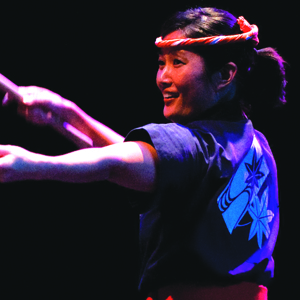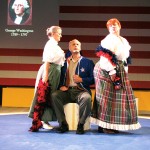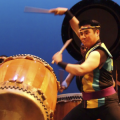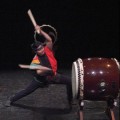Wisa Uemura took over as Executive Director of San Jose Taiko last year after performing for over 14 years. Growing up in the rural area of Kula, Maui, Hawaii, Uemura had seen taiko before, but first started playing in 1993 during her first year at Stanford University. After earning a degree in psychology, Uemura auditioned for San Jose Taiko and began performing with them in 1998. Uemura has since lead outreach programs, junior taiko courses and traveled nationally and internationally performing taiko.
Name: Wisa Uemura
Age: 37
Occupation: Executive Director of San Jose Taiko
How long have you lived and worked in San Jose?
Since ‘99, and lived here since ‘98. I’ve worked for San Jose Taiko.
What do you like most about San Jose?
I really enjoy that it’s a big city but it feels like a small town in many ways. I come from a very rural area in Hawaii and so I didn’t want to live into a very urban town. I love that San Jose has a lot of the benefits of a big city but it still feels friendly and comfortable like a smaller town to me.
What brought you to San Jose?
It was San Jose Taiko. I went to school at Stanford University and started playing taiko there. I really wanted to take a break before grad school and I auditioned for San Jose Taiko, and just never made it back to school!
When were you first introduced to taiko?
It was in college. Growing up in Hawaii I had seen it, but I didn’t really connect with it. But at my freshman orientation at Stanford I saw the Stanford Taiko and I fell in love with the art form. I was fortunate to get into that group and played with them for four years before I graduated.
What is your favorite part of being executive director?
I would say there’s a lot of responsibilities with being executive director. I think being able to represent and work for an organization that I really believe in and I truly value. There’s something very meaningful in that. My husband is the artistic director and we often look at each other and say we are so fortunate to be able to do something that we are so passionate about.
What have been some of your best memories since joining San Jose Taiko?
I probably have to say meeting my husband. We auditioned the same year in 1998. That’s number one. Number two is a mix of both our traveling abroad to perform, and our hometown performances. I really loved our tour of Mexico in 2004. We went to some really small towns in Mexico, it was really amazing. The music and the art definitely crosses the language barrier. Here at home, I love our annual Obon Festival and in Japantown. It feels like we’re playing for 4000 members of our family.
How do you like to spend your time when you’re not drumming?
Normally I like to chill out at home and relax, just spend time with my husband and my family. I have a four week old baby and so that pretty much takes up most of my time now.
What are some of your favorite places in San Jose?
In Japantown, there’s my absolute favorite restaurant, Gombei. We also like hanging out at Fourth Street Bowl for some recreational bowling and some nice diner food.
If you could change on thing about San Jose, what would it be?
I think I would like to change how people outside of San Jose see us. I’d like to change their perception of San Jose, what they don’t know about it. When I talk to my family they’re like, “Where is San Jose?” I think we have a really wonderful, eclectic city, very cultural, very artsy and diverse. People don’t know that, they only know it as part of the tech world and part of Silicon Valley. So I wish San Jose’s reputation could be a different and include more of the wonderful arts and culture scene that we have here. There are many organizations working towards that and I think they’re doing great work and we’re making great strides.
Who is the most interesting person you’ve met in San Jose?
I’m going to cop out. I’m going to have to say two people: the recently retired cofounders of San Jose Taiko, Roy and P.J. Hirabayashi. Even though we’re all Japanese-American, their experience growing up was so different than mine and it’s given me such a different perspective about what it means to be Japanese-American. When I started taiko, I wasn’t looking for a culturally identifiable activity, I just wanted to play. But what they’ve created here with Japanese values has really helped me appreciate being Japanese-American.

 U.S. Census: San Jose Wealthiest City in Country
U.S. Census: San Jose Wealthiest City in Country  44 Plays for 44 Presidents
44 Plays for 44 Presidents 


